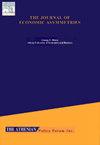Are the effects of monetary policy larger in recessions? A reconciliation of the evidence
Q1 Economics, Econometrics and Finance
引用次数: 0
Abstract
This paper investigates whether there are significant differences in the response of U.S. output to monetary policy shocks in expansions vs. recessions. Much of the existing literature has found that monetary policy shocks have larger effects during recessions. However, recent influential work by Tenreyro and Thwaites (2016) finds the opposite result, and leaves the literature on this important question with a lack of consensus. Using the empirical framework of Tenreryo and Thwaites (2016) as a baseline, we provide a systematic exploration for the key drivers of differing results regarding the effects of monetary policy shocks over the business cycle. We find two key elements drive the results, the first being whether the local projection impulse response function estimator is conducted in levels vs. long differences of the data, and the second being the treatment of outliers observed in measures of monetary policy shocks during the Volcker disinflation. We conclude that the evidence is more supportive of monetary policy shocks having larger effects during recessions.
在经济衰退中,货币政策的影响是否更大?证据的调和
本文研究了在经济扩张和经济衰退时期,美国产出对货币政策冲击的反应是否存在显著差异。许多现有文献发现,货币政策冲击在经济衰退期间的影响更大。然而,Tenreyro和Thwaites(2016)最近有影响力的工作发现了相反的结果,并使关于这个重要问题的文献缺乏共识。使用Tenreryo和Thwaites(2016)的经验框架作为基线,我们对货币政策冲击对商业周期影响的不同结果的关键驱动因素进行了系统的探索。我们发现驱动结果的两个关键因素,第一个是局部投影脉冲响应函数估计是否是在数据的水平与长差异中进行的,第二个是在沃尔克反通胀期间货币政策冲击测量中观察到的异常值的处理。我们的结论是,证据更支持货币政策冲击在衰退期间产生更大的影响。
本文章由计算机程序翻译,如有差异,请以英文原文为准。
求助全文
约1分钟内获得全文
求助全文
来源期刊

Journal of Economic Asymmetries
Economics, Econometrics and Finance-Economics, Econometrics and Finance (all)
CiteScore
4.80
自引率
0.00%
发文量
42
审稿时长
50 days
 求助内容:
求助内容: 应助结果提醒方式:
应助结果提醒方式:


